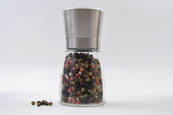
In traditional Chinese Medicine, this seasoning is recommended to eliminate a stagnant stomach condition due to damp cold in the digestive tract. In plain English, this condition can create symptoms such as indigestion, bloating, and abdominal pain after eating and acid reflux. Black pepper speeds up the digestive tract and the movement of food through the digestive tract.
Digestion
All stimulant herbs and spices speed up the digestive tract. Black pepper is a cure for sluggish digestion, which is a major contributor to obesity, fatigue and a low metabolism. It is thought to stimulate the production of HCL or hydrochloric acid in the stomach. HCL production controls digestion by breaking down protein and stimulating the production of digestive enzymes from the pancreas. Without adequate stomach acid, digestion suffers.
Vitiligo
A compound in pepper helps to cure Vitiligo, which is a skin disease that causes some areas of skin to lose its normal pigmentation and turn white. Through an investigation of Chinese and Ayurvedic medicine herbal remedies, the active ingredient in black pepper, piperine, was discovered in research done in London to stimulate the skin to produce pigment. Topical treatment of piperine combined with ultra violet light therapy is much more effective than the other harsher, more chemically-based treatments for vitiligo. It also reduces the chances of skin cancer due to excessive ultraviolet radiation.
Respiratory Benefits
In the traditional Indian medicine of Ayurveda, pepper is added to tonics for colds and coughs. Relief from sinusitis and nasal congestion is created by taking black pepper. It‘s expectorant property helps to break up the mucus and phlegm depositions in the respiratory tract. The natural irritant quality helps you to expel loosened material through the act of sneezing or coughing. The elimination of mucus and phlegm aids in healing the infection that arose in this area.
Antibacterial
All spices have powerful antibacterial and antiviral benefits. This is one of the protective benefits of eating spicy food in hot climates. Bacteria and virus grows easily in hot environments. The antibacterial property of black pepper helps to fight against infections and insect bites. In addition, pepper added to the diet helps to keep your arteries clean by scraping and clearing the walls, thereby helping to reduce atherosclerosis, the condition highly responsible for heart attacks and strokes.
Increases Bioavailability
Black pepper is added to Indian Ayurvedic and Chinese Medicine formulas to help in transporting the benefits of other herbs to different parts of body. In addition, it maximizes the efficiency of the other health foods that we consume. Adding black pepper to foods, not only makes the food more delicious, but in addition helps you better absorb the nutrients from food.
Brain Health and Neurological Health
Piperine, one of the key components of black pepper, has been shown in numerous studies to reduce memory impairment and cognitive malfunction. Chemical pathways in the brain appear to be stimulated by these organic compounds in black pepper. The research is still in its infancy but early results look promising for benefiting Alzheimer patients and those suffering from dementia other age related brain disorders.
Peptic Ulcers
Numerous studies have shown that black pepper may have beneficial effects on gastric mucosal damage and peptic ulcers, due to its antioxidant and anti-inflammatory properties. More research is still being done on this aspect of black pepper health effects.
Research continues into the benefits of this tasty spice.
How to Add Black Pepper to Foods
- Use pepper during cooking and keep a pepper mill on your dining table so that you can add its intense spark to a host of different recipes that you prepare.
- Olive oil, lemon juice, salt and cracked pepper make a delicious salad dressing.
Cautions
All stimulant herbs and spices stimulate the body to action. If overused by people who are in a weakened or deficient condition, they can create a weaker condition. People who have irritable bowel or other similar colon conditions may find black pepper and other spices irritating to their colons.
Other hot inflammatory conditions as in certain skin conditions may find too much black pepper can worsen the condition. When the condition improves, black pepper may be a helpful addition to a person’s diet that can improve the person’s overall condition.



 RSS Feed
RSS Feed